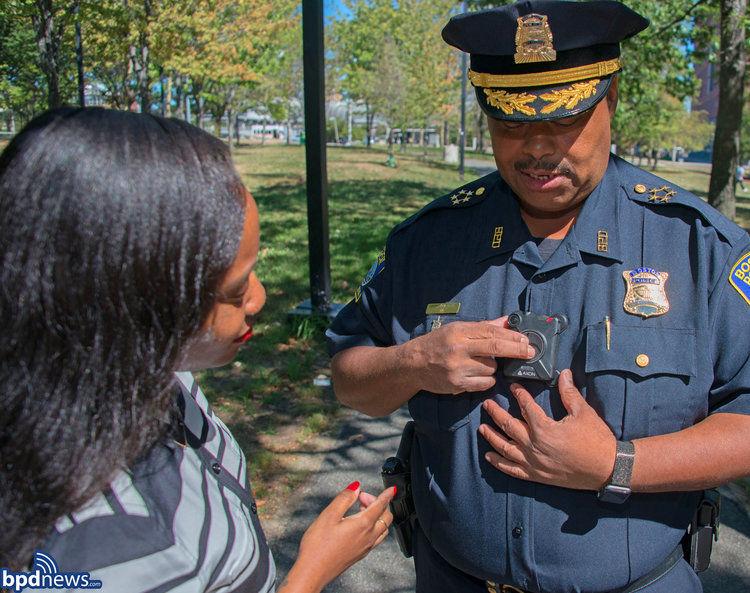On March 13, Boston Police Department Commissioner William Evans announced that the department would extend the Body Worn Camera Pilot Program by six months. The program was scheduled to end this month, but the department announced that it will continue until Sept. 11, 2017.
The program, which started in September 2016, originally faced a lot of resistance from the Boston Police Patrolmen’s Association (BPPA). The pilot was supposed to start the year before in September of 2015, but the department could not get any volunteers. Following that, the department randomly chose 100 officers to be part of the study. The BPPA filed a lawsuit against the department, but it was struck down by Suffolk County Superior Judge Douglas Wilkins, who cited that the union had not helped the city find volunteers.
According to Boston Mayor Martin J. Walsh, an agreement was reached for the extension with the BPPA. Commissioner Evans told the Boston Globe that while there was a lot of resistance in 2015 and 2016, he had not heard of any complaints from the officers since it had begun.
The program currently consists of 100 patrol officers and eight members of the command staff, including Superintendent-in-Chief William Gross, the highest ranking uniformed officer in the department. According the WBUR, “55 are white, 29 are black, 13 are Latino, and three are Asian. And 87 of the 100 officers are men.” The news source also mentioned that the patrol officers come “from five sections of the city and the department’s Youth Violence Strike Force [the department’s gang unit].”
The cameras for the trial period are provided by two different companies, Seattle-based Vievu and Taser International. Gross, who wears one built by Taser International, told WBUR in 2016, “You can’t alter it, you can’t send it to YouTube, you can’t touch it. It’s all administrators [that] can only touch that.” He added that the footage goes to “An external storage device that’s kept at the station.”
According to the commissioner, the department has so far collected 1,905 hours of footage since the beginning date of Sept. 12, 2016.
Police officials reported that last year, the footage was being reviewed by researchers from Northeastern University and that they would be looking at “police-community relations, use of force, arrests, and other areas,” according to the Boston Globe.
The department noted on March 13 that in two weeks they will begin looking for experts who can analyze existing data, look at different body cameras and vendors, and recommend how best to use the cameras.
Many are in support of the extension of the program. Staff attorney Carl Williams, who works for the American Civil Liberties Union of Massachusetts, told Boston University’s student newspaper, The Daily Free Press, “I think it changes people’s interactions [with the police].”
He added, “It is also a statement that says that we’re concerned about police misconduct and the potential for police violence.”
Mayor Walsh also praised the department and union, saying, “This extension is a positive development, and I look forward to continuing to build on the success of this pilot program.”
Though there is praise for the program, some would still like there to be more transparency. Williams told The Daily Free Press, “I have a desire, as part of this organization [the ACLU of Massachusetts] and personally, that I would like to know [what is going on with the program],” Williams said. “Secondly, that is public information…and it needs to be made public.”
South End resident Daniel O’Brien told the paper that he believes that the public would trust the police more if they gave the public more information, stating, “I think they should release what they have, just so people can get an idea of how [the program] works.”
Others are critical of the program because they see it as a political move. The Boston Police Camera Action Team (BPCAT) is a group that has pushed for more accountability and is hoping that body cameras will become mandatory for officers. BPCAT co-organizer, Segun Idowu, told The Daily Free Press that he sees the extension as a stall tactic by the city during an election year. He told the paper that if 2017 was not an election year, he feels that the department would already have a full program.
Commissioner Evans stated that the extension will allow officers to wear the cameras during what he called “the busiest months of the year,” according to CBS Boston.
Evans added, “Extending through the summer will give us the opportunity to keep the body worn cameras out in the community and will provide additional data to assist with the assessment of the program.”
The City of Boston has allocated $500,000 to support the program as part of Fiscal Year 2017. The funding will include “project management service, evaluation, and potentially, personnel costs,” according to the Beacon Hills Times.





















































